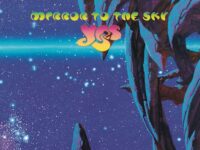I remember listening to a pre-release review copy of 2014’s Heaven and Earth for the first time and thinking: “There’s quite a bit of music on here that most Yes fans will have problems with.” However, the final song on the album did manage to make me sit up and take notice.
“Subway Walls” is 9 minutes and 9 seconds of (somewhat) progressive rock. Its title had me conjuring up worrying images of a Lambretta-wielding Paul Weller emerging from a graffiti-stained subterranean underpass, but there’s actually a lot to like about this Jon Davison/Geoff Downes composition. When I interviewed Downes back in July 2014, I told him this was one of my favorite songs on the album and it remains so today.
The song starts with a slow keyboard, chordal passage which includes a deliberately unsettling chord change. At first, I found this quite startling but I quickly grew to like it. Downes then moves the tempo up a notch with an orchestral-sounding section complete with synthesized double-bass downward run. It’s an effective move, particularly when electronic timpani appear in combination with a glockenspiel sound. There’s more experimentation in this opening than in most of the rest of the album, for me, and if not exactly a classic Yes approach, at least the song is trying to say something a bit unusual.
After this mini-overture, Geoff Downes turns to a soothing, electric piano sound over-layered with strings and Chris Squire is tempted to add a treble-drenched bass line, playing one of the melodic themes of the piece. Drums join in and then Steve Howe doubles the bass guitar pattern at a higher octave.
Soon there is another change with drums and bass playing a short, repeated stabbing pattern reminiscent of the approach on parts of “Mind Drive” from 1997’s Keys to Ascension 2. The fragmented accompaniment continues beneath Davison’s jazz-influenced line, which is angular and clearly engineered to reinforce the lyrics which talk about metaphysical and existential themes.
Some of the previous lyrics on Heaven and Earth are questionable, but these work really well. The feel of this part of the song is refreshing and showcases both the dynamic writing partnership of Davison and Downes and the instrumentalists’ mastery. The unusual vocals continue, now with backing harmonies and then the chorus appears with the bass and guitar riff beneath. There is complexity here, with beautifully constructed and arranged parts.
The previous bass-and-drum figure reappears to form what turns out to be a verse structure and next a stripped-down explorative passage gives instrumentalists the chance to riff on the main material as Jon Davison adds finger clicks. Geoff Downes does a little bit of Tony Kaye channelling and adds a satisfying, if relatively short, solo Hammond with a frisson of old-world charm.
The initiative is taken over by Steve Howe for a solo which recalls his work of past decades and the patchwork of sections then takes us back to previous material in a more expansive version before yet another change – this time to a section consisting of a big vocal melody over a pattern of 3 7-4 bars and one 8-4 bar. It’s a great effect and recalls some of the poise of the big productions of yesteryear. Downes brings back early material beneath soaring Davison vocals and Howe adds big solo lines into the heady mix.
Overall, I think the feel of “Subway Walls” is the most effective on Heaven and Earth, but it still doesn’t quite tip over into the kind of precision, energy and commitment we have come to expect from Yes albums of all eras. It’s all just slightly uninspired and slightly uninspiring.
However, make no mistake: This is still good Yes music, regardless of your reaction to the rest of the album – and a fine way to finish.
- Yes, “Mystery Tour” from ‘The Quest’ (2021): YESterdays - November 23, 2021
- Yes, “Minus the Man” from ‘The Quest’ (2021): YESterdays - October 5, 2021
- Yes, “Subway Walls” from ‘Heaven and Earth’ (2014): YESterdays - December 8, 2020



